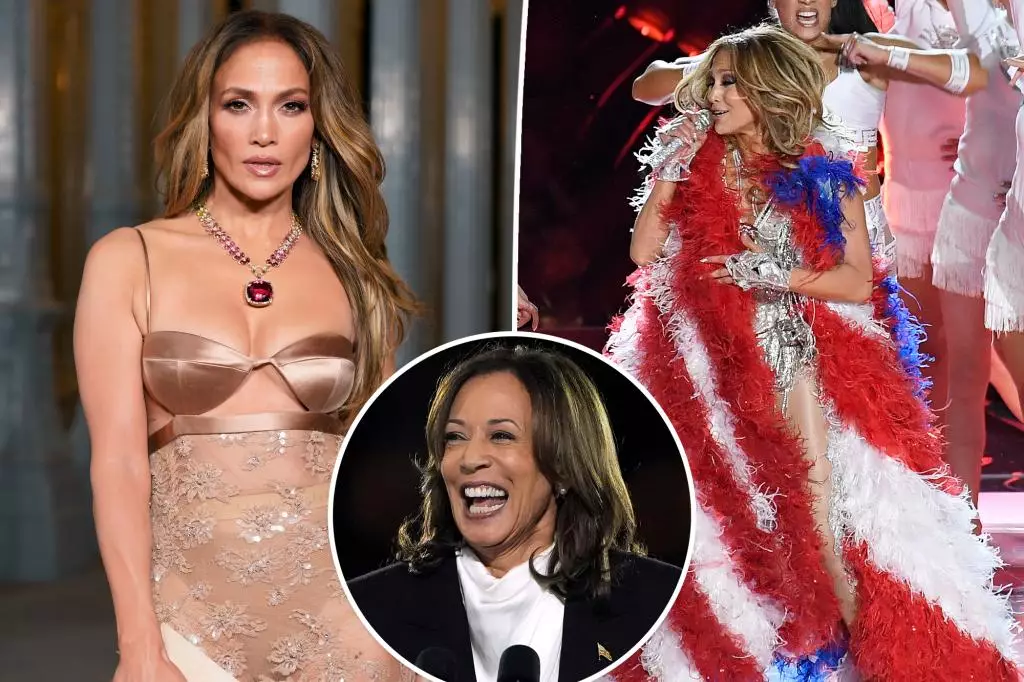In a powerful display of solidarity, Jennifer Lopez found herself at the forefront of a rally for Vice President Kamala Harris in Las Vegas, directly responding to the recent surge of racist comments made by comedian Tony Hinchcliffe. The fallout from Hinchcliffe’s jokes, which many deemed offensive and divisive, resonated deeply with Lopez, who deliberately used her platform to protect the dignity of Puerto Ricans and all marginalized communities. Her critique was not limited to Hinchcliffe but also extended to former President Donald Trump, whom she accused of fostering division amongst Americans. This is significant, as it shows how the cultural landscape is shifting, with public figures taking actionable stances against racism and inequality.
Lopez articulated her sentiments emphatically, declaring, “It wasn’t just Puerto Ricans that were offended; it was every Latino in this country.” This not only reflects her personal stake as a Puerto Rican but also acknowledges the wider Latino community’s collective consciousness. The statement serves as a reminder of the interconnectedness of minority struggles, emphasizing that when one group is attacked, it reverberates across others who share similar experiences of marginalization.
Moreover, Lopez’s rallying cry for women’s empowerment amplifies her role as a crucial voice in contemporary discourses about gender equality. “I believe in the power of women,” she proclaimed, underscoring how women’s voices are integral to shaping the future of politics. By intertwining her advocacy for women with support for the Latino community, Lopez constructs a narrative that positions both groups as essential players in the upcoming elections. Such statements play a vital role in encouraging collective action and fostering a sense of agency among women and Latinos.
In an era when minority voices are often overlooked, Lopez’s insistence on the importance of voting cannot be overstated. She encouraged her followers to recognize the power inherent in their votes, asserting, “Your vote is your voice and your power, and our voices are louder together.” This message is not merely rhetoric; it is a call to action, urging individuals to become active participants in the democratic process. By promoting initiatives such as ‘When We All Vote,’ which she co-chairs, Lopez aligns herself with a movement dedicated to democratizing the voting process and increasing electoral participation.
Lopez’s engagement goes beyond speeches and social media posts; she actively employs her pop culture influence to galvanize voters. Her recent collaboration in crafting a humorous yet impactful song, “Get Your A** Out & VOTE,” exemplifies how entertainment can intersect with civic responsibility. By combining laughter with a serious message, she successfully captures the attention of a younger audience, encouraging them to view voting as an essential duty rather than a chore.
Further solidifying her role as a cultural icon committed to social justice, Lopez’s flags during her Super Bowl performance—representing both Puerto Rican and American heritage—serve as a vibrant visual metaphor for her message of inclusivity. This display resonated with her followers, highlighting the dual identity many Latinos in America navigate while simultaneously celebrating their roots.
Lopez’s support for Harris is emblematic of a broader trend within the entertainment industry, where artists are increasingly leveraging their platforms for political advocacy. The recent endorsement from Beyoncé adds another layer to this collective movement, illustrating a unity among celebrities who are willing to transcend their fame in favor of critical sociopolitical issues. Their actions juxtapose the lighthearted nature of their careers with the sobering reality of the political landscape, where families and future generations’ well-being hangs in the balance.
As the deadline to vote approaches, Lopez’s efforts exemplify how public figures can galvanize entire communities toward meaningful change. The forthcoming elections represent not only a chance for political voice but also an opportunity for cultural commentary, reminding us that individual actions can have a profound ripple effect. The message is clear: standing up against division and mobilizing communities can pave the way for a brighter, inclusive future.

